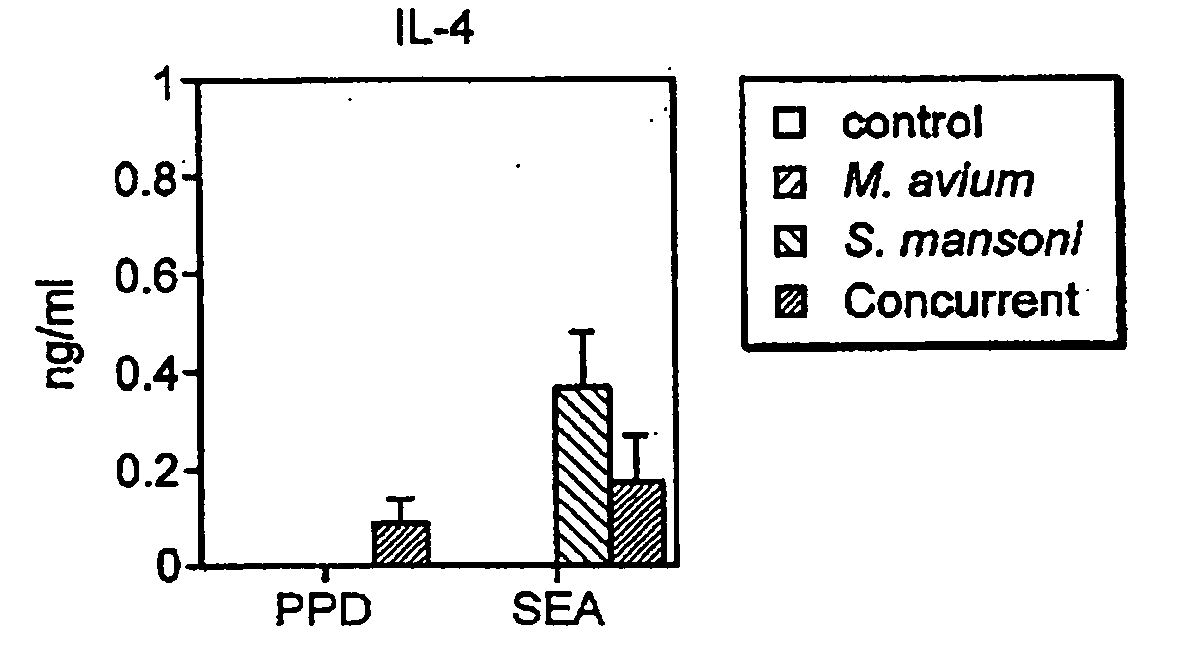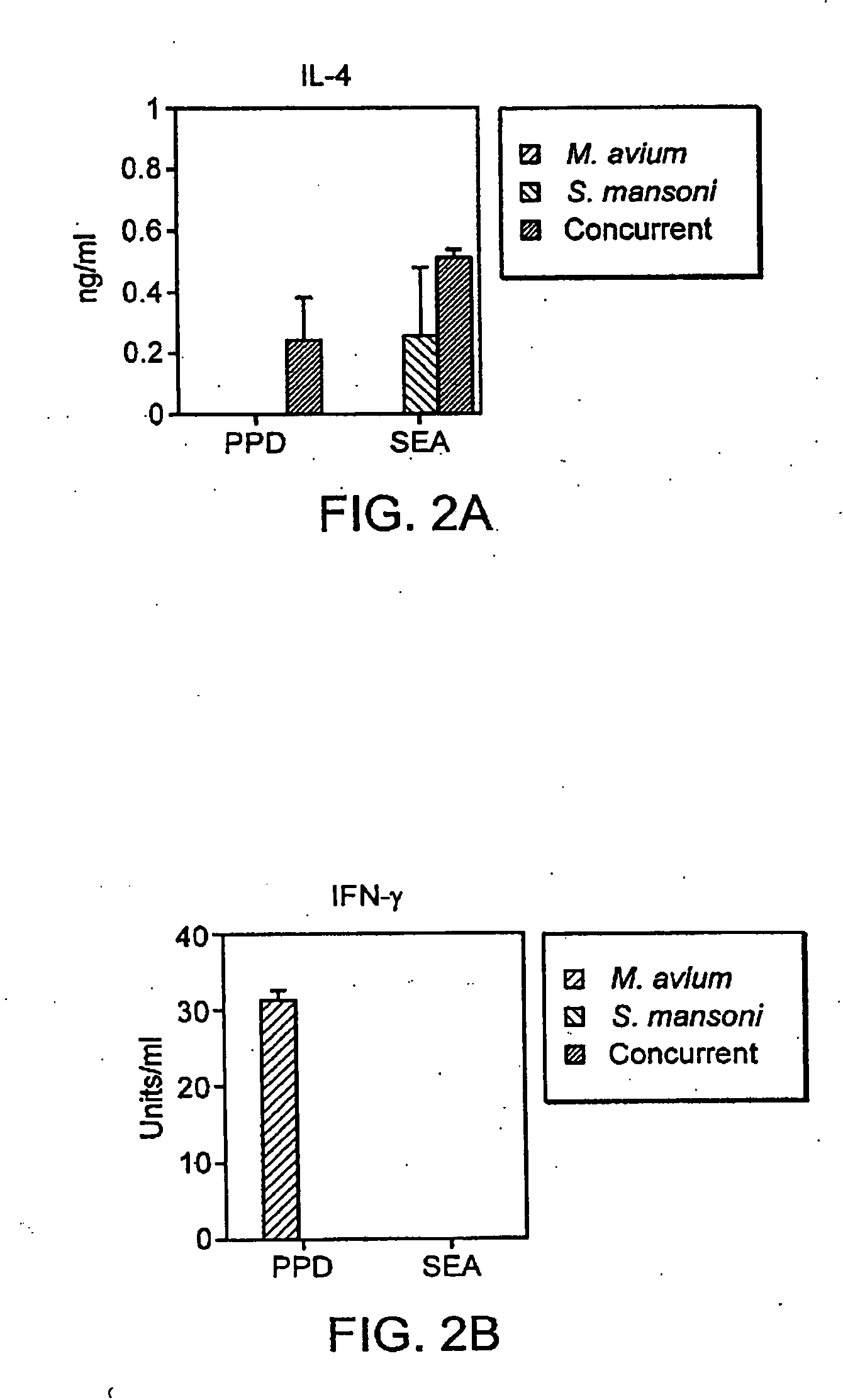Use of parasitic biological agents for prevention and control of autoimmune diseases
a technology of autoimmune diseases and biological agents, which is applied in the field of use of parasitic biological agents for the prevention and control of autoimmune diseases, can solve the problems of ulcerative colitis rare in underdeveloped countries, unhealthy to be raised in an “over clean” environment, and worm expulsion or limitation of infection, so as to prevent or treat an excessive immune response and reduce the excessive immune response in the individual
- Summary
- Abstract
- Description
- Claims
- Application Information
AI Technical Summary
Benefits of technology
Problems solved by technology
Method used
Image
Examples
example 1
General Methods
[0130] Animals: Colonies of 129 / SV IL-10− / − mutant mice, and appropriate control animals are maintained are housed in facilities maintained as a specific pathogen-free environment according to standard methods.
[0131] Parasite Maintenance, Animal Infection, Production of Schistosome Eggs: The maintenance of T. muris and the method used for infection are as described by Else and Wakelin, 1990, Parasitology, vol. 100, part 3: 479.
[0132] Schistosome eggs were harvested from the livers of schistosome-infected hamsters and stored as described by Elliott, 1996, Methods: A Companion to Methods in Enzymology, 9:255. Five infected hamsters yield about 2×106 eggs.
[0133] Preparation of T. suis Eggs: the following process was used in the preparation and harvesting of T. suis eggs. Adult T. suis worms were isolated from the colon of pigs 7-8 wks after exposure to an experimental inoculation of T. suis eggs. Embryonated eggs were obtained by culturing adult worms in vitro, and t...
example 2
Th2 Response to S. mansoni Down-Modulates an Ongoing Th1 Response to an Unrelated Bacterial Th1-Inducing Antigen
[0141] It is well established that Th cell immune responses can polarize into Th1 or Th2 patterns. This polarization occurs because IFNγ from Th1 cells inhibits proliferation of Th2 cells, while IL-4 and IL-10 from Th2 cells inhibits development of Th I cells. The following experiments demonstrated that schistosomiasis alters the murine Th1 response to an established mycobacterial infection.
[0142] Mice were co-infected with M. avium and S. mansoni to evaluate the host response to these distinctly different Th1 and Th2 inflammatory stimuli. BALB / cAnN mice develop chronic M. avium infection when injected with this organism (106 CFU). Sixty days after establishment of the mycobacterial infection, the mice were infected with S. mansoni (40 cercariae). The mice were killed sixty days later. Control groups included mice receiving either M. avium only for 120 days or S. mansoni...
example 3
Colonization with Intestinal Helminths or Exposure to their Ova Attenuates Th1-Type Gut Inflammation in Murine TNBS-Induced Colitis
[0146] Rectal instillation of TNBS in 50% ethanol induces a colitis in mice that shares features with Crohn's disease. The colonic inflammation is characterized by infiltrating CD4+ T cells with elevated IFNγ mRNA expression. Lamina propria T cells from TNBS treated mice secrete 50 fold more IFNγ and 5 fold less IL4 than T cells from controls (Neurath et al., 1995, supra). Lamina propria mononuclear cells secrete 30 fold more TNFα than cells from control mice (Neurath et al., 1997, Eur. J. Immunol., 27: 1743). Importantly, TNBS colitis can be prevented or improved by treatment with anti-IL-12 (Neurath et al., 1995, supra), anti-TNFα (Neurath et al., 1997, supra), or rIL-10 (Duchmann et al., 1996, Eur. J. Immunol., 26: 934). TNBS-induced colitis also can be prevented by previous oral exposure to the hapten (Elson et al., 1996, J. Immunol., 157: 2174) pro...
PUM
| Property | Measurement | Unit |
|---|---|---|
| volumes | aaaaa | aaaaa |
| wavelength | aaaaa | aaaaa |
| wavelength | aaaaa | aaaaa |
Abstract
Description
Claims
Application Information
 Login to View More
Login to View More - R&D
- Intellectual Property
- Life Sciences
- Materials
- Tech Scout
- Unparalleled Data Quality
- Higher Quality Content
- 60% Fewer Hallucinations
Browse by: Latest US Patents, China's latest patents, Technical Efficacy Thesaurus, Application Domain, Technology Topic, Popular Technical Reports.
© 2025 PatSnap. All rights reserved.Legal|Privacy policy|Modern Slavery Act Transparency Statement|Sitemap|About US| Contact US: help@patsnap.com



